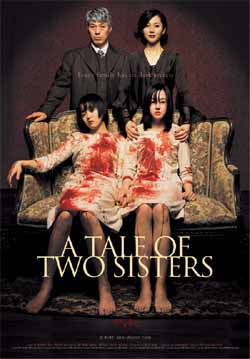I’m starting to doubt that Asian cinema consists of anything more than suited men shooting guns in slow motion, mystic helium-sucking ninja warriors in Crayola colored pyjamas, and spooky slow-burning ghost stories. Thankfully, A Tale of Two Sisters is refreshingly a little different than the likes of Ringu, Ju-On or The Eye, leaning far more towards psychological sensibilities than a horror angle. Unfortunately for many, it is even more deliberately paced than even the most deliberately paced Asian horror movie and twice as complex.
Su-Mi and Su-Yeon are two young girls recently released from a mental institution. They have returned home to live with their brooding father and neurotic stepmother. Instead of a placid place to aid their recovery they find themselves having to cope with not only their slightly unhinged stepmother’s increasing cruelty but the possibility that a restless ghost may be present in their home. Strange occurrences, sounds and visions plague the girls and the stepmother. But with the two girls and the stepmother all either mentally ill or on medication, is the whole thing just in their minds, are the mysterious goings-on in the house real or is nothing what it seems to be at all?
A Tale of Two Sisters is undoubtedly the first real answer to M. Night Shyamalan we are seeing from the Asian market. A quite complex psychological tale, it twists and turns in so many directions that it took me a while after watching it to fully work out exactly what had been going on. There is an obligatory twist (that many might see coming from this type of movie) but it occurs about halfway in, complicating the storyline instead of resolving it. Even when the final wrap up comes around, it is only in the final minutes of an extended act that we’re finally given any insight into the truth of what we have seen and still nothing is clear-cut without a little thought on the viewer’s part.
Where Two Sisters differs slightly from the norm is the way in which it never spells anything out definitively, which may come as a shock to more dumbed-down western sensibilities. Director Ji-Woon Kim walks a fine line between giving you enough information to work things out yourself while never really explaining everything fully. It’s a brave move to credit your audience with enough brains to mull it over themselves without being utterly bamboozled when leaving the theatre but Kim just manages to pull it off. That it works is to his credit because in a movie like this, if things become too obvious too soon, it destroys half the enjoyment of trying to puzzle it all out alongside the characters.
As I mentioned in my opening, the pacing of Two Sisters is slow. Very slow. For the first fifteen or twenty minutes you might imagine you’re actually watching some weird "Little House On The Paddyfield" rural drama. Ji-Woon Kim never rushes anything, moving the camera slowly and deliberately, capturing both the lazy comfort of Japanese countryside in the summer and the weird forboding of the house beautifully. He never rushes to get anywhere to satisfy the ADHD crowd and the whole thing is pinned-down with an understated yet haunting piano-led score something akin to the style used in Cronenberg’s Spider. This, like in Spider, creates a weird subdued almost surreal atmosphere about the movie that some like myself might love but may bore others to tears. There are actually a few more parallels between this and Cronenberg's work but due to the potential for spoilers in both movies I won’t go into them.
Asian cinema lovers will probably lap this up even if it’s a slightly different brand of horror than everyone’s become accustomed to recently. Non Asian cinema lovers will probably find themselves bored by the lack of dynamic action, lack of scares, and the evil that is the reading of the subtitles.
Your Daily Blend of Entertainment News

